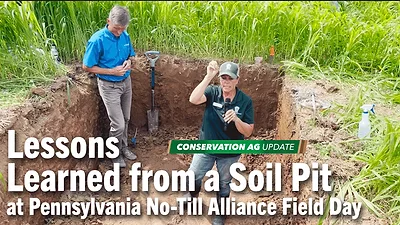Ricky Rhode of Dorchester County, S.C., has a cotton field that is just unbelievable to some people
"When I was planting this field, I had people come by and ask me what I was doing — like I was crazy for attempting to plant into residue!" says Rhode.
Skeptical observers told Rhode that it wouldn’t work, but he proved them all wrong when he strip-tilled cotton and turned the field into a success. Rhode has been working with Jeff Lucas, NRCS district conservationist in St. George, S.C., to continuous strip-till 500 acres of cotton, corn and soybeans.
Rhode co-manages R&R Farms with his brother, Dennis. Like their father, the Rhode brothers have lived on the farm all their lives and have a lot of pride in their work. Lucas praised the brothers.
“They were willing to try conservation tillage and once they realized the benefits, they were determined to stick with it,” Lucas says. “They also cooperate in field days and demonstration projects so that local farmers can also see first hand the benefits of conservation tillage.”
Back in the 1970s, Rhode rented a no-till planter from the Dorchester conservation district office. He also received cost-share to try conservation tillage.
“If it wasn’t for NRCS incentive programs, I’m not sure I would have tried conservation tillage on my own,” says Rhode. “When I realized the long-term cost savings, reduced wear and tear on my equipment, and the time savings, I was hooked.”
As a professional land surveyor, Rhode works on the farm in his spare time, which is limited.
“I needed a way to save time and with strip-till you can get the job done twice as fast without any loss in crop yields,” Rhode says.
Conservation tillage also cuts down on tractor trips across the field, and Rhode points out that this is essential with fuel prices going up.
“I save money with strip-till because I don’t have to constantly fuel up my equipment,” he says. “Strip-till allows me to get my farming done and maintain my land surveying company.”
Lucas has been working with R&R Farms since he first came to work in Dorchester County 6 years ago.
“They started growing cotton about 5 years ago and because cotton is very time consuming, strip-till has really been a lifesaver for them,” says Lucas. “There are start up costs associated with switching to conservation tillage such as buying equipment, but in the long run, farmers can save money because their equipment will last twice as long.”
Rhode tells other farmers about conservation tillage and encourages them to at least try it. "Some people don’t like strip-till because it’s not pretty," he says.
Leaving the residue on the ground might not look neat and tidy, but it’s best for the soil and for the farmer too.
"There has to be a full commitment on the farmer’s part in order for conservation tillage to work and many of them have to change age-old attitudes which might stop them from trying something new," says Rhode.
Now, when other farmers drive by R&R Farms and see Rhode planting directly into residue, they don’t seem so surprised. Instead, they get out and ask him what he’s doing to have such healthy crops, and he proudly tells them the benefits of conservation tillage.





